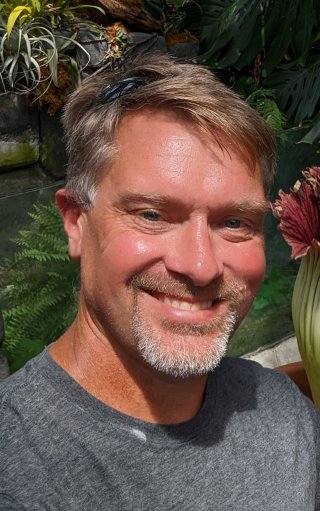Meet EPA Researcher Heath Mash, Ph.D.

EPA researcher Heath Mash is an analytical chemist with EPA’s Office of Research and Development in Cincinnati, Ohio. Heath’s research specializes in analytical method development and applied research focusing on the occurrence, transformation and treatment of algal toxins associated with harmful algae blooms (HABs). Heath's research seeks to understand what water quality conditions produce algal toxins, in additon to the transformation, removal, and fate of these toxins downstream on a watershed scale. Research projects include partnering with USEPA regional offices, federal agencies, state agencies and academic institutions which consist of monitoring algal toxin migration throughout local and regional watersheds.
Tell us about your background.
I’m originally from the Cleveland area and grew up in Parma Heights, Ohio. I have always been a fan of sports in general and am a Cleveland fan in general; the Cleveland Browns/Indians (Guardians)/Cavalier’s fan.
I went to Old Dominion University, graduating with a dual degree in chemistry and physics. I received my Ph.D. at Ohio State University in environmental science and began my career at Arizona State University as a post-doctoral research student. I was hired at the EPA as a chemist in 2003.
How does your science matter?
My main studies have focused on harmful agal blooms. Cyanobacteria are like our ancient ancestors that have learned to evolve and survive as the planet has changed over millions of years. Some of these cyanobacteria produce chemicals that can be highly toxic to both humans and animals. My research into harmful algal blooms seeks to understand why these blooms happen, under what conditions these toxins are produced and how we can avoid them in the future.
When did you first know you wanted to be a researcher?
I knew I wanted to be in the sciences at an early age. I unfortunately did not have the knowledge at the time or the exposure to different sciences to know exactly what I wanted to do. I originally thought it would be cool to be a meteorologist. When cable was first introduced, the weather channel was my favorite cable network and I would watch it constantly. I have always been fascinated by hurricanes. I would follow the hurricane and tropical updates all the time. I wanted to know how they formed and why they formed.
It took me well into my college years to know I wanted to be a chemist and could do something related to chemistry that could make a difference.
What impact do you see your research having?
If we can understand what, how and why harmful algal blooms are produced, hopefully in the future we can seek to avoid the production of the toxins that are increasingly impacting our rivers, lakes and oceans.
If you weren’t a scientist, what would you be doing?
Outside any scientific profession, I think I would have been a librarian. I love to read and I always thought the other profession I would have pursued was working as a librarian. When I retire, I am still thinking of pursuing this profession.
Any advice for students considering a career in science?
Don’t obsess over grades. Learn the lessons that your teachers are teaching, but don’t obsess over your grades. I know grades are important but knowing and retaining what you have learned is most important in the end. Be well-rounded and participate in other activities such as sports or volunteering opportunities.
What do you think the coolest scientific discovery was and why?
As an avid Star Trek fan, I would say the possibility of wormholes (Einstein-Rosen bridges) existing would be the coolest scientific discovery in my lifetime. In actuality, the discovery of penicillin in 1929 is far and away the most impactful scientific discovery of the modern scientific era. It has led the discovery of many lifesaving and life extending treatments and paved the way for all these wonderful medical breakthroughs that have saved countless lives and extended our life expectancy well longer than would otherwise be possible without such modern medicines.
What do you think will be our biggest scientific challenge in the next 20/50/100 years?
Our biggest scientific challenges into the mid-century and beyond is dealing with climate change. As humans continue to change and evolve the world around themselves, the earth is continuously in jeopardy of being further thrown out of balance. The challenge for us as a global community is to recreate that balance in nature and the Earth where every natural thing can live in equilibrium and be beneficial for everyone. This includes our exploration into deep space as humanity expands beyond our Earthly confines.
Editor's Note: The opinions expressed herein are those of the researcher alone. EPA does not endorse the opinions or positions expressed.
